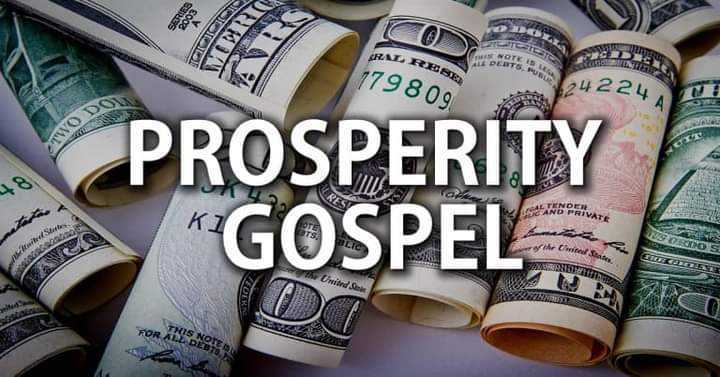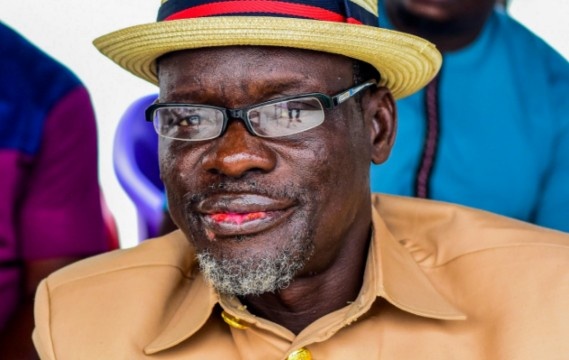PROSPERITY THEOLOGY: History, Disciples, Exploits and Latest Developments

"The flesh must be out of the way for men to make it to Heaven on the last day. Teaching about prosperity is a feel-good message. I am sorry to say that prosperity has gone a little bit crazier this time around. And today, I want to correct my own theology about prosperity gospels, sowing of seeds, and monetization of the gospel. When I read the Bible now, I don’t see it with the same eye I saw it 20 years ago. . . The gospel is totally free. I am done with anything prosperity gospel and monetization of the gospels," — Benny Hinn.
Prosperity theology (sometimes referred to as the prosperity gospel, the health and wealth gospel, the gospel of success, or seed faith) is a religious belief among some Protestant Christians that financial blessing and physical well-being are always the will of God for them, and that faith, positive speech, and donations to religious causes will increase one's material wealth. Material and especially financial success is seen as a sign of divine favor. This has been the practice from the late 18th century. So, what is changing now?
Prosperity theology has before now been criticized by leaders from various Christian denominations, including within some Pentecostal and charismatic movements, who maintain that it is irresponsible, promotes idolatry, and is contrary to the Bible. Secular as well as some Christian observers have also criticized prosperity theology as exploitative of the poor. The practices of some preachers have attracted scandal and some have been charged with financial fraud.
In 2005, Matthew Ashimolowo, the founder of the largely African Kingsway International Christian Centre (KICC) in southern England, which preaches a "health and wealth" gospel and collects regular tithes, was ordered by the Charity Commission to repay money he had appropriated for his personal use. In 2017, the organisation was under criminal investigation after a leading member was found by a court in 2015 to have operated a Ponzi scheme between 2007 and 2011, losing or spending £8 million of investors' money.
In 2007, U.S. Senator Chuck Grassley opened a probe into the finances of six televangelism ministries that promoted prosperity theology: Kenneth Copeland Ministries, Creflo Dollar Ministries, Benny Hinn Ministries, Bishop Eddie Long Ministries, Joyce Meyer Ministries, and Paula White Ministries. In January 2011, Grassley concluded his investigation stating that he believed self-regulation by religious organizations was preferable to government action. Only the ministries led by Meyer and Hinn cooperated with Grassley's investigation.
In prosperity theology, the Bible is viewed as a contract between God and humans: if humans have faith in God, he will deliver security and prosperity. The doctrine emphasizes the importance of personal empowerment, proposing that it is God's will for his people to be blessed. The atonement (reconciliation with God) is interpreted to include the alleviation of sickness and poverty, which are viewed as curses to be broken by faith. This is believed to be achieved through donations of money, visualization, and positive confession.
It was during the Healing Revivals of the 1950s that prosperity theology first came to prominence although commentators have linked the origins of its theology to the New Thought movement which began in the 19th century. The prosperity teaching later figured prominently in the Word of Faith movement and 1980s televangelism. In the 1990s and 2000s, it was adopted by influential leaders in the Pentecostal movement and charismatic movement in the United States and has spread throughout the world. Prominent leaders in the development of prosperity theology include E. W. Kenyon, Oral Roberts, A. A. Allen, Robert Tilton, T. L. Osborn, Joel Osteen, Creflo Dollar, Kenneth Copeland, Reverend Ike, and Kenneth Hagin.
According to historian Kate Bowler, the prosperity gospel was formed from the intersection of three different ideologies: Pentecostalism, New Thought, and "an American gospel of pragmatism, individualism, and upward mobility". This "American gospel" was best exemplified by Andrew Carnegie's Gospel of Wealth and Russell Conwell's famous sermon "Acres of Diamonds", in which Conwell equated poverty with sin and asserted that anyone could become rich through hard work. This gospel of wealth, however, was an expression of Muscular Christianity and understood success to be the result of personal effort rather than divine intervention.
The New Thought movement, which emerged in the 1880s, was responsible for popularizing belief in the power of the mind to achieve prosperity. While initially focused on achieving mental and physical health, New Thought teachers such as Charles Fillmore made material success a major emphasis of the movement. By the 20th century, New Thought concepts had saturated American popular culture, being common features of both self-help literature and popular psychology.
E. W. Kenyon, a Baptist minister and adherent of the Higher Life movement, is credited with introducing mind-power teachings into early Pentecostalism. In the 1890s, Kenyon attended Emerson College of Oratory where he was exposed to the New Thought movement. Kenyon later became connected with well-known Pentecostal leaders and wrote about supernatural revelation and positive declarations. His writing influenced leaders of the nascent prosperity movement during the post-war American healing revival. He taught that Christ's substitutionary atonement secured for believers a right to divine healing. This was attained through positive, faith-filled speech; the spoken word of God allowed believers to appropriate the same spiritual power that God used to create the world and attain the provisions promised in Christ's death and resurrection. Prayer was understood to be a binding, legal act. Rather than asking, Kenyon taught believers to demand healing since they were already legally entitled to receive it.
Kenyon's blend of evangelical religion and mind-power beliefs—what he termed "overcoming faith"—resonated with a small but influential segment of the Pentecostal movement. Pentecostals had always been committed to faith healing, and the movement also possessed a strong belief in the power of speech (in particular speaking in tongues and the use of the names of God, especially the name of Jesus). Kenyon's ideas would be reflected in the teachings of Pentecostal evangelists F. F. Bosworth and John G. Lake (who co-led a congregation with New Thought author Albert C. Grier prior to 1915).
While Kenyon's teachings on overcoming faith laid the groundwork for the prosperity gospel, the first generation of Pentecostals influenced by him and other figures, such as Bosworth, did not view faith as a means to attain material prosperity. In fact, early Pentecostals tended to view prosperity as a threat to a person's spiritual well-being. By the 1940s and 1950s, however, a recognizable form of the doctrine began to take shape within the Pentecostal movement through the teachings of deliverance and healing evangelists. Combining prosperity teaching with revivalism and faith healing, these evangelists taught "the laws of faith ('ask and ye shall receive') and the laws of divine reciprocity ('give and it will be given back unto you')".
Oral Roberts began teaching prosperity theology in 1947. He explained the laws of faith as a "blessing pact" in which God would return donations "seven fold", promising that donors would receive back from unexpected sources the money they donated to him. Roberts offered to return any donation that did not lead to an equivalent unexpected payment. In the 1970s, Roberts characterized his blessing pact teaching as the "seed faith" doctrine: donations were a form of "seed" which would grow in value and be returned to the donor. Roberts began recruiting "partners", wealthy donors who received exclusive conference invitations and ministry access in exchange for support.
In 1953, faith healer A. A. Allen published The Secret to Scriptural Financial Success and promoted merchandise such as "miracle tent shavings" and prayer cloths anointed with "miracle oil". In the late 1950s, Allen increasingly focused on prosperity. He taught that faith could miraculously solve financial problems and claimed to have had a miraculous experience in which God supernaturally changed one-dollar bills into twenty-dollar bills to allow him to pay his debts. Allen taught the "word of faith" or the power to speak something into being.
In the 1960s, prosperity became a primary focus in healing revivals. T. L. Osborn began emphasizing prosperity in the 1960s and became known for his often ostentatious displays of personal wealth. During that decade, Roberts and William Branham criticized other prosperity ministries, arguing that their fund-raising tactics unfairly pressured attendees. These tactics were prompted in part by the expense of developing nationwide radio networks and campaign schedules. At the same time, leaders of the Pentecostal Assemblies of God denomination often criticized the focus on prosperity taken by independent healing evangelists.
During the 1960s, prosperity gospel teachers embraced televangelism and came to dominate religious programming in the US. Oral Roberts was among the first, developing a syndicated weekly program that became the most watched religious show in the US. By 1968, television had supplanted the tent meeting in his ministry. Reverend Ike, a pastor from New York City, began preaching about prosperity in the late 1960s. He soon had widely aired radio and television programs and became distinguished for his flashy style. His openness about love for material possessions and teachings about the "Science of the Mind" led many evangelists to distance themselves from him.
In the 1980s, public attention in the US was drawn to prosperity theology through the influence of prominent televangelists such as Jim Bakker. Bakker's influence waned, however, after he was implicated in a high-profile scandal. In the aftermath, Trinity Broadcasting Network (TBN) emerged as the dominant force in prosperity televangelism, having brought Robert Tilton and Benny Hinn to prominence.
Although nearly all of the healing evangelists of the 1940s and 1950s taught that faith could bring financial rewards, a new prosperity-oriented teaching developed in the 1970s that differed from the one taught by Pentecostal evangelists of the 1950s. This "Positive Confession" or "Word of Faith" movement taught that a Christian with faith can speak into existence anything consistent with the will of God. Kenneth Hagin was credited with a key role in the expansion of prosperity theology. He founded the RHEMA Bible Training Center in 1974, and over the next 20 years, the school trained more than 10,000 students in his theology. The teachings of Kenneth Hagin have been described by Candy Gunther Brown of Indiana University as the most "orthodox" form of Word of Faith prosperity teaching.
In the 2000s, Evangelical-Pentecostal churches teaching prosperity theology saw significant growth in the Global South and Third World countries. According to Philip Jenkins of Pennsylvania State University, poor citizens of impoverished countries often find the doctrine appealing because of their economic powerlessness and the doctrine's emphasis on miracles. One region seeing explosive growth is Western Africa, particularly Nigeria. In the Philippines, the El Shaddai movement, part of the Catholic Charismatic Renewal, has spread prosperity theology outside Protestant Christianity. One South Korean prosperity church, Yoido Full Gospel Church, gained attention in the 1990s by claiming to be the world's largest congregation.
A 2006 poll by Time reported that 17 percent of Christians in America said they identified with the movement. By the 2000s, adherents of prosperity theology in the US were most common in the Sun Belt. By 2006, three of the four largest congregations in the US were teaching prosperity theology, and Joel Osteen has been credited with spreading it outside of the Pentecostal and Charismatic movement through his books, which have sold over 4 million copies. Bruce Wilkinson's The Prayer of Jabez also sold millions of copies and invited readers to seek prosperity.
But of recent, there seems to be a new shift on prosperity theology. In 2019, Benny Hinn took to social media Facebook to tender an apology to Christians over his false teachings on prosperity, sowing of seed, and monetizing the gospel. According to the cleric, the apology was a necessity because he doesn’t want to be rejected in Heaven on the last day. In 2022, Ceflo Dollar declared that he was wrong on his teaching on tithing. According to him, the teachings on tithing cannot be established as a grace teaching as anything that does not come out of free will is not the gospel of grace. "Religion uses guilt and fear to hold people down. That is what the teaching of tithing does" he said.
Will more disciples follow in the footsteps of Benny and Dollar? That remains to be seen. However, without doubt there seems to be a new school of thought emerging whose views run contrary to the disciples of prosperity theology.
Source: Wikipedia
#penglobalentertainment #prosperitytheology



